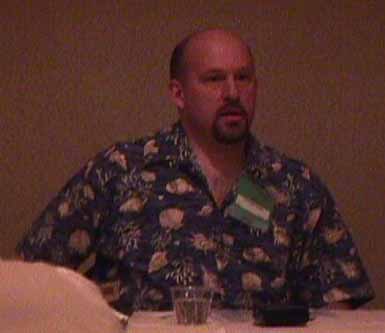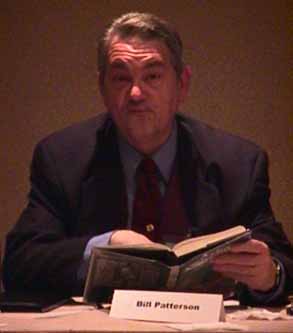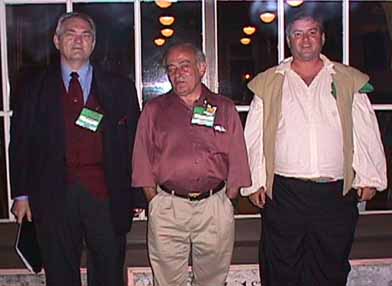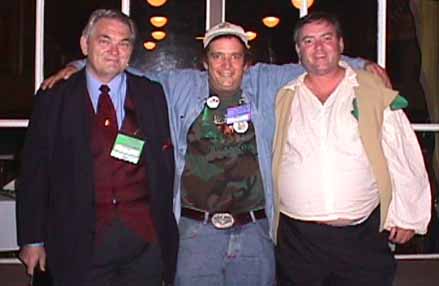



Dr. Robert James talked about Heinlein's real life women. It turns out that the guy was married three times in his life. Not much is known about the first marriage, which seems to not have lasted long at all somewhere in the 1920s. His other wives were very competent women, renascience characters in their own ways. Both of them were remarkably educated, with career accomplishments of their own and considerable beauty. His second marriage, to Leslyn, was the one that made him into a writer. Leslyn knew a lot about theater and stories, and might have been music manager for a major motion picture studio during the 1920s. However, she came from a family with drinking problems, and her drinking ended that marriage during the 1940s. Robert married Virginia not long after that, and they stayed together for the rest of his life, until he died. One of the reasons his estate is so valuable now is that Virgina Heinlein has done a good job of stewarding it since the author died.
That book Bill Paterson is reading from is Grumbles From the Grave, a posthumous collection of Robert Heinlein's letters. I think the one he was reading in this picture was the one Heinlein wrote to his agent where he explained that he wanted to make people think with his writing. Before the formal panel started though, he said a few words about the Heinlein estate in general. It turns out that the continuing popularity of Heinlein's 58 books is such that his estate may turn out to be one of the most valuable ones in modern history. He is writing an authorized biography of Heinlein, and he expects it to be out in a year or two, printed by a major publishing house.
David Silver was the only recovering lawyer on the panel. He kicked off the meeting by making sure everybody in the room had a copy of the latest issue of The Heinlein Journal, which has a long obituary about Virginia Heinlein in it. He has read every Heinlein once or twice a year since he discovered them in his teenybopper years. He talked about how it was a struggle for Heinlein to get any kind of interesting content on women into his stories, working against censors like Daglesh, the woman who edited his works at Scribners. Some of his more entertaining victories were Lummox, the alien princess who felt her job was "raising John Thomases" and Tunnel In The Sky, which had an acronym that many find interesting.
Geo Rule talked about the strong female characters in Heinlein's early work. Click on his picture above to read a paper version of his speech. The site where it is hosted is a major Heinlein Fan site, and is the brainchild of Geo and Deb. Over dinner they shared a lot of hot tips they had figured out from making it with the Heinlein Society, so maybe that site (click on the newsletter above to check it out) will be improving soon.
Deb Rule is one of the people behind a major Heinlein fan website. What I remember more than her many cogent points about women in Heinlein's work was the background she shared later over dinner. It turns out that in 19th Century America there were two kinds of women. Eastern women were exploited and downtrodden baby factories. Western women were the backbone of their society in many ways. Growing up on the frontier in Missouri, Heinlein was clearly in a world where women took major leadership roles as a matter of course. (Wyoming and Texas both had female Governors in the late 1800s.) This could easily have been part of what made the women in his stories such influential characters. Click on her picture above for the complete version of what she said at the meeting.


After the meetings were over, we all went out to eat together. Unfortunately, I forgot to pull out my camera until most of the crowd was gone. David Silver and I took turns behind the lens, so the fact that we were in the same place was recorded. Missing from the pictures are the Rules, the Jameses, and a couple of guys whose names I didn't manage to get.
Many interesting things were discussed over that meal. The feeling I remember the best was the sense that Heinlein and his peers were trying to make a radical cultural revolution happen through science fiction, because there were no other avenues available to them. What they accomplished was remarkable, considering all the forces lined up against them.
3060